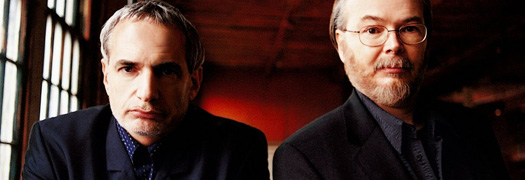
Features | Concerts
Steely Dan
By Andrew Hall | 14 July 2011
The WaMu Theater is a more malleable space than I’d ever thought of it as being. I know this because I’ve now seen two shows under entirely different circumstances there and experienced two completely different atmospheres. When I saw My Bloody Valentine play a half-sold show there in 2009, it was a mix of twenty- and thirty-somethings either feeling nostalgic or curious to witness the punishing energy of a band able to induce out of body experiences from sheer exposure to noise. When I saw Steely Dan just a few weeks ago, on the other hand, those twenty- and thirty-somethings made up the smallest percentage of a crowd I’d ever been a part of.
This, judging by my friends’ reactions to telling them I’d seen Steely Dan, shouldn’t have been much of a surprise. When I went to purchase the tickets, it was hard to shake the sense of “Am I really doing this?” as I contributed more than I feel comfortable contributing to Walter Becker and Donald Fagen’s likely quite-healthy retirement funds. Yet I couldn’t help it; unlike my friends, as it turns out, I’ve become thoroughly convinced that Becker and Fagen will, upon actually calling it quits, leave behind one of the richest and most subversive back catalogs from pop’s most overwrought decade, as snarling as it is melodically and rhythmically stunning. I’ve become one of those people who actually says “Have you actually listened to them?” when people make off-base comparisons to musicians like Jimmy Buffett, who didn’t dose their laid-back rhythms with any kind of poison. I’d say I’d become a dad, but I got no one pregnant and my own father finds Steely Dan completely insufferable, so that’s probably not what’s up.
Regardless, I felt unwelcome at the WaMu Theater that night. It was extremely clear that I wasn’t in the same tax bracket as the majority of the audience; the venue smelled eerily reminiscent of a commercial airliner’s first class cabin as one walks through it into coach, and the people inside of it largely reflected this. Beyond the monied men in their fifties and sixties there for a good time, the rest could be split between trophy spouses, children of monied men in their fifties and sixties wearing Beavis and Butt-Head shirts, and jazz hippies. And then there was me, having turned 23 the week before, uncertain as to what the hell I was doing there exactly. Becker and Fagen probably wouldn’t have wanted it any other way.
Following a brief set from Sam Yahel’s organ trio, which got a far better reception for an organ trio playing three or four ten-minute pieces as an opening act there than I think they would under just about any other circumstance, Steely Dan emerged over the course of “Dizzy’s Bidness” by bringing out its rhythm section, its horns, and its backup singers before Becker and Fagen came out to rapturous applause and opened with “Your Gold Teeth.” They then moved into Aja‘s (1977) title track and Gaucho (1980) single “Hey Nineteen,” which now features a long, rambling monologue between chorus and bridge from Becker, practically setting up the song’s mention of Cuervo Gold as a punchline for an audience that probably hasn’t gone for the cheap stuff in decades.
Live, the ensemble feels far less like a pop band than a group of performers riffing on Becker and Fagen’s song structures. Many songs felt like they’d been extended to make room for solos, while Fagen spent a fair amount of time away from his electric piano in favor of melodica. At times, this worked well—“Aja” was as dense and as stunning in its breakdowns as it is on record, and “Everything Must Go” conveyed its sadness effortlessly—but it also drained some of the energy within “Show Biz Kids” and left a handful of songs during the set’s middle stretch feeling meandering and frustrating despite the fact that the band was certainly not focusing exclusively on their reunion records, as I’d been warned they tend to.
The final stretch of the set, which focused entirely on singles, felt very much like appeasement for whatever had happened over the previous thirty-five minutes, a striking rework of “Dirty Work” (on which backup singers Carolyn Leonhart-Escoffery, Cindy Mizelle, and Catherine Russell traded vocals, and finally convinced me that the duo might’ve been onto something when they initially aspired to simply be Brill Building-style professional songwriters) and Gaucho standout “Time Out of Mind” excepted. “Do It Again,” “Reelin’ in the Years,” and “Kid Charlemagne” all got the treatment they deserved—something everyone seemed to agree on, if the guy singing the horn leads from “Peg” out of tune as they came in were any indicator.
Yet there was still a sense that having spent exactly how much I spent to see this band, I would’ve preferred a setlist that touched on Katy Lied (1975), my favorite Dan record, or just something longer. Two hours is fine by indie rock standards, but I remember spending considerably less to see Elvis Costello tear through his back catalog for upwards of three hours once without getting at all jammy on us, and I’d be lying if I were to say I wouldn’t love to see this ensemble do the same thing. As I was leaving that Costello show, at a different venue with a very different kind of audience, I was inexplicably asked “Do you work here?” by Jamie Lee Curtis. Here there were no such questions, no random celebrities confusing with the rest of WaMu’s room full of sextegenerians; I couldn’t have looked, or felt, more out of place.





